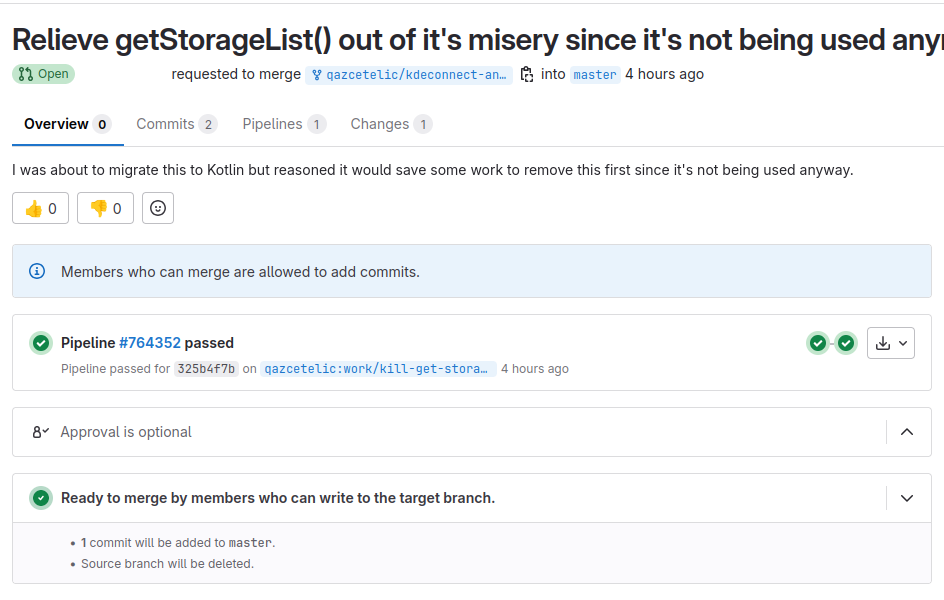With Rust it’s usually just a fluke that can be fixed by doing that, but C++ linker errors may indicate the start of several frustrating hours. That’s been my experience at least.
I joined Lemmy back in 2020 and have been using it as qaz@lemmy.ml until somewhere in 2023 when I switched to lemmy.world. I’m interested in Linux, FOSS, and several other subjects.
- 28 Posts
- 340 Comments
This would have been better with Rust and C++

 72·7 days ago
72·7 days agoIt seems like you’re missing a word

 7·7 days ago
7·7 days agoWhat’s the difference between the normal app and element X? Why create a new app?
EDIT: I installed it, but can’t verify for some reason.
EDIT: It works now, and it’s very fast compared to the other client. It’s a shame spaces aren’t supported.

 6·9 days ago
6·9 days agoGotta watch out for those rabbits messing with your kernel
C exists

 9·14 days ago
9·14 days agoOh okay, are you referring to the Amazon link in the description? That link is a generic affiliate link that just redirects to “laptop” but gives him a comission when someone buys something on Amazon after, it’s not a specific product he sells on there.

 2·14 days ago
2·14 days agoIt didn’t happen in the US though, so I’m not sure why that’s relevant.

 2·14 days ago
2·14 days agoI’m sorry, but what are you referring to?

 3·15 days ago
3·15 days agoI still wonder why they decided to write their own UI framework from scratch.

 3·15 days ago
3·15 days agoRider can do code replacement too and has worked much better in my experience

 27·15 days ago
27·15 days agoThe company I work for loves Azure. If it’s not available as an Azure service it won’t be used (except for uptime kuma). Some time ago there was a global Azure outage and we could do literally nothing. All tasks and code were on Azure Devops and all communication went through Teams and Outlook.
The webhook integration has also recently been removed from Teams so uptime kuma also didn’t work for like a week until it was fixed by using Azure’s automation service.
Some people (like me) like having a more compact layout

 16·20 days ago
16·20 days agoA classmate I was doing a project with saved his code as screenshots in a word document.

 32·1 month ago
32·1 month agoI think that might have moved over from Reddit.
There are only 7 unit test classes. 2 of which I wrote myself this month.
I already did so an hour ago

UPDATE: It has been merged
Found it while refactoring KDE Connect Android.

 17·1 month ago
17·1 month agoNew Firefox forks are quite interesting. I’ve tried it, these are my impressions so far:
- The UI looks a little bit too much like a generic electron app to me, there is no option for native GTK or QT theming.
- It seems they ship version that use the newer CPU instructions to optimize the application, I’m not sure standard Firefox does. This is neat. It does feel a bit faster but I’m unsure whether this is because of optimizations or because I have 100x as many tabs open on vanilla Firefox right now.
- The vertical tabs are very nice. I currently use the “Tree Style Tab” extension and some hacky CSS scripts for that, and this seems like it would work a lot better.
- The shortcuts are off by default, which is nice, but still seem to be the same as Firefox.
- It feels a bit buggy. I had to restart the application to be able to load a site.
- They kept Firefox sync, which I like.
- You can choose between dark and light mode on the first startup, but I haven’t been able to find the setting again.
Conclusion Overall, a decent Firefox rebrand. Better tab management, split windows, and workspaces seem quite nice. I would probably consider using it if it put the settings in 1 place and didn’t have any bugs.







Could you give an example of something related to hardware that most developers don’t know about?